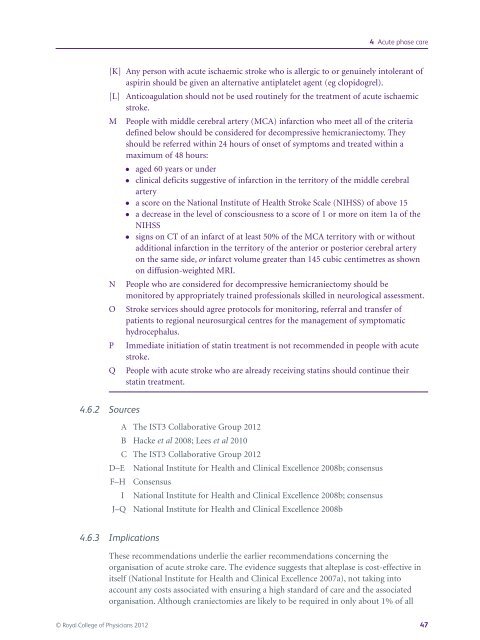national-clinical-guidelines-for-stroke-fourth-edition
national-clinical-guidelines-for-stroke-fourth-edition
national-clinical-guidelines-for-stroke-fourth-edition
You also want an ePaper? Increase the reach of your titles
YUMPU automatically turns print PDFs into web optimized ePapers that Google loves.
[K] Any person with acute ischaemic <strong>stroke</strong> who is allergic to or genuinely intolerant of<br />
aspirin should be given an alternative antiplatelet agent (eg clopidogrel).<br />
[L] Anticoagulation should not be used routinely <strong>for</strong> the treatment of acute ischaemic<br />
<strong>stroke</strong>.<br />
M People with middle cerebral artery (MCA) infarction who meet all of the criteria<br />
defined below should be considered <strong>for</strong> decompressive hemicraniectomy. They<br />
should be referred within 24 hours of onset of symptoms and treated within a<br />
maximum of 48 hours:<br />
● aged 60 years or under<br />
● <strong>clinical</strong> deficits suggestive of infarction in the territory of the middle cerebral<br />
artery<br />
● a score on the National Institute of Health Stroke Scale (NIHSS) of above 15<br />
● a decrease in the level of consciousness to a score of 1 or more on item 1a of the<br />
NIHSS<br />
● signs on CT of an infarct of at least 50% of the MCA territory with or without<br />
additional infarction in the territory of the anterior or posterior cerebral artery<br />
on the same side, or infarct volume greater than 145 cubic centimetres as shown<br />
on diffusion-weighted MRI.<br />
N People who are considered <strong>for</strong> decompressive hemicraniectomy should be<br />
monitored by appropriately trained professionals skilled in neurological assessment.<br />
O Stroke services should agree protocols <strong>for</strong> monitoring, referral and transfer of<br />
patients to regional neurosurgical centres <strong>for</strong> the management of symptomatic<br />
hydrocephalus.<br />
P Immediate initiation of statin treatment is not recommended in people with acute<br />
<strong>stroke</strong>.<br />
Q People with acute <strong>stroke</strong> who are already receiving statins should continue their<br />
statin treatment.<br />
4.6.2 Sources<br />
A The IST3 Collaborative Group 2012<br />
B Hacke et al 2008; Lees et al 2010<br />
C The IST3 Collaborative Group 2012<br />
D–E National Institute <strong>for</strong> Health and Clinical Excellence 2008b; consensus<br />
F–H Consensus<br />
I National Institute <strong>for</strong> Health and Clinical Excellence 2008b; consensus<br />
J–Q National Institute <strong>for</strong> Health and Clinical Excellence 2008b<br />
4.6.3 Implications<br />
4 Acute phase care<br />
These recommendations underlie the earlier recommendations concerning the<br />
organisation of acute <strong>stroke</strong> care. The evidence suggests that alteplase is cost-effective in<br />
itself (National Institute <strong>for</strong> Health and Clinical Excellence 2007a), not taking into<br />
account any costs associated with ensuring a high standard of care and the associated<br />
organisation. Although craniectomies are likely to be required in only about 1% of all<br />
© Royal College of Physicians 2012 47


